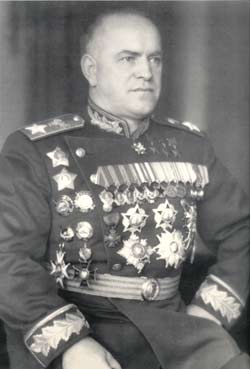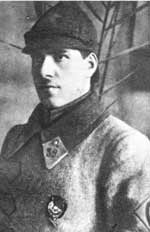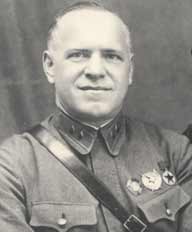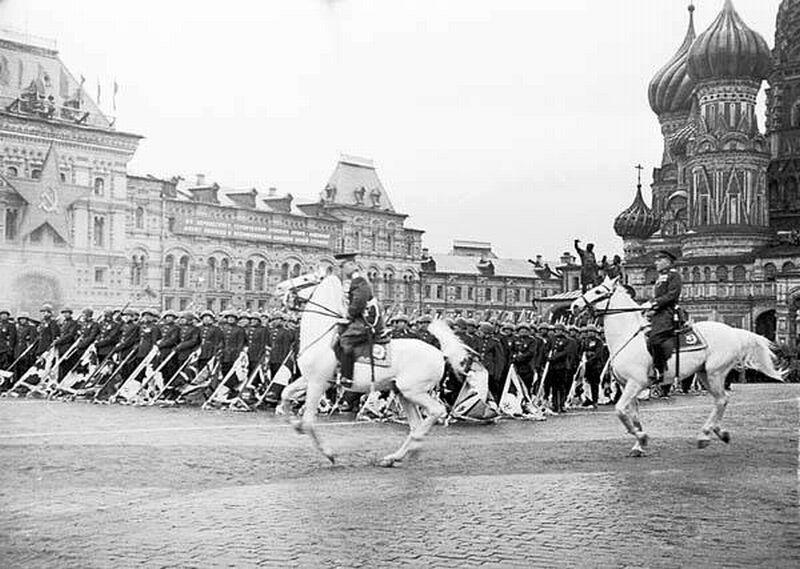Marshall
Georgy Konstantnovich Zhukov
(12/1/1896-6/18/1974)
 Georgy Konstantinovich Zhukov was born into a peasant family in Strelkovka, Kaluga
Province near Moscow, Russia. He was then apprenticed to work in Moscow. In 1915
Zhukov was conscripted into the army of the Russian Empire, where he served in a dragoon regiment as a private.
During WWI Zhukov received an order of the St George Cross twice. He was promoted to
the rank of non-commissioned officer for his bravery in battle.
Georgy Konstantinovich Zhukov was born into a peasant family in Strelkovka, Kaluga
Province near Moscow, Russia. He was then apprenticed to work in Moscow. In 1915
Zhukov was conscripted into the army of the Russian Empire, where he served in a dragoon regiment as a private.
During WWI Zhukov received an order of the St George Cross twice. He was promoted to
the rank of non-commissioned officer for his bravery in battle.
After Russian Revolution in 1917 Zhukov joined the Bolshevik Party
where his background of poverty became an asset. After recovering from typhus he fought in the Russian Civil War
(1918 - 1920). Oddly enough he was fighting against Pilsudski, who was adamant
anti-communist.
 Georgy Konstaninovich Zhukov has served as a military commander
in Byelorussian Soviet Socialist Republic for 17 years (1922-1939). He is shown
in the photo left as commander of a regiment (1923). It is in Belarus he had formed and matured as high military commander. Zhukov respected
Belarusian culture, spoke fluent Belarusian language and was known to command
troops in Belarusian. His respect to different ethnic cultures was also
exhibited in his position
against anti-Semitism in Soviet Army (also here). Zhukov was commander of a regiment, and in 1930 of a brigade.
In early 30-ies Zhukov commanded
4th Leningrad's Red-Banner cavalry division named after Voroshilov stationed
in Belarusian Military Region (BVO). He was a keen proponent of the new theory of
armored warfare and w
Georgy Konstaninovich Zhukov has served as a military commander
in Byelorussian Soviet Socialist Republic for 17 years (1922-1939). He is shown
in the photo left as commander of a regiment (1923). It is in Belarus he had formed and matured as high military commander. Zhukov respected
Belarusian culture, spoke fluent Belarusian language and was known to command
troops in Belarusian. His respect to different ethnic cultures was also
exhibited in his position
against anti-Semitism in Soviet Army (also here). Zhukov was commander of a regiment, and in 1930 of a brigade.
In early 30-ies Zhukov commanded
4th Leningrad's Red-Banner cavalry division named after Voroshilov stationed
in Belarusian Military Region (BVO). He was a keen proponent of the new theory of
armored warfare and w as noted for his detailed planning, tough discipline and strictness.
Unlike Marshall
Tuhachevsky and many other military commanders of Red Army, Zhukov survived Joseph Stalin purges of 1937.
The photo of Zhukov on the right is dated 1938. In 1939 he was
transferred to Moscow and then immediately to Far East where he commanded a
group of Soviet troops that defeated Japanese invasion at Halhin-Gol.
as noted for his detailed planning, tough discipline and strictness.
Unlike Marshall
Tuhachevsky and many other military commanders of Red Army, Zhukov survived Joseph Stalin purges of 1937.
The photo of Zhukov on the right is dated 1938. In 1939 he was
transferred to Moscow and then immediately to Far East where he commanded a
group of Soviet troops that defeated Japanese invasion at Halhin-Gol.
On June 22 1941 Belarus and USSR was attacked by Hitler Germany.
Zhukov becomes a member of General Headquarters of Red on June 26, 1941. He
delivers a first
victory over Germans in the battle of El'nia as a head of Reserve Front in
1941. Zhukov becomes a high commander
of Western Front in October 1941 - August 1942 - the front on the line of
main German attack. He was in charge of the defense of Leningrad and Moscow. In
August 1942 he becomes 1st Vice-Commissar of the People's Commissariat of
Defense. Zhukov has coordinated all the main decisive battles with Nazi Germans
in Soviet Union: breakthrough of Leningrad
blockade, Battle
of Moscow in 1942, the biggest in human history Kursk
Arch tank battle, he was in command of the main battle of thje WWII - Battle
of Stalingrad - which has truly decided an outcome of the war, Battle for
Dnieper. It is Zhukov, who commanded the 1st and 2nd Byelorussian Fronts
liberating Belarus from Nazi in the summer of 1944 (Operation "Bagration").
Later Zhukov was in charge of Wisla-Oder strategic offensive initiative and
capturing Berlin. Marshall Georgy Konstantinovich Zhukov was in charge of the
official capitulation of Germany ceremony on May 8, 1945. Marshall Zhukov on a
white horse was was in charge of the WWII Victory Military Parade in Moscow
commanded burning captured Nazi Military Flags on the Red Square (see photo
below).

Marshall Zhukov was so popular in Soviet Union that Stalin
perceived him as a threat and demoted Zhukov in 1947 to command Odessa
military region (thousand of kilometers from Moscow). Zhukov has supported a
revolt against Stalinist Communist party headed by Molotov and chief of secret
police (NKVD) Lavrenty Beria. While he was instrumental in bringing Khrushchev
to power he disagreed with massive de-mobilization of Army (11 million military
men was cut to 4 million in Soviet Army by Khruschov). And so around 1960
Marshall Zhukov has become a forbidden figure in USSR. At the end of his life
Zhukov was rehabilitated and published a famous book "Vospominaniia i
Razmyshleniia" ("Memoirs and Thoughts"). Everything about
Marshall Zhukov is popular in Belarus. He stayed in the memory of common folks
in Belarus, Russia, Ukraine and many other former Soviet Union countries as a
just and strong leader, a beloved true people's hero. Today portraits of Lenin,
Stalin and Zhukov appear in the demonstrations of the retirees nostalgic of the
USSR grandeur. Zhukov's image was somewhat hyped and some of the information
that we discover about Zhukov today sounds more realistic and sometimes even
disturbing. Take, for example this quote of Marshall Zhukov to General
Eisenhower (1945): "If we come to a minefield, our infantry attacks exactly
as it were not there." One must remember the human price of Zhukov's
victories - millions of Soviet solders have died. Nevertheless one could only be
horrified with what could happen if we lost to Nazi all the battles that were
won under Marshall Zhukov command.
 Zhukov's
bio at Freedictionary.com
Zhukov's
bio at Freedictionary.com
 Zhukov
At the Oder: The Decisive Battle for Berlin - Book by Tony Le Tissier
Zhukov
At the Oder: The Decisive Battle for Berlin - Book by Tony Le Tissier
 Marshall
Zhukov. Pages of biography - video
Marshall
Zhukov. Pages of biography - video
 Memoirs
of Zhukov's daughter about father.
Memoirs
of Zhukov's daughter about father.
 Marshall
Zhukov military rewards
Marshall
Zhukov military rewards
Other Relevant Pages of the Virtual Guide to Belarus
 Belarusian Castles and
Knighthood
Belarusian Castles and
Knighthood
 Historic Belarusian Battles
Historic Belarusian Battles
 Belarusian
Statehood
Belarusian
Statehood
 History
of Belarus
History
of Belarus
 The Belarusian Cities guide is a part of the Virtual Guide to Belarus - a
collaborative project of Belarusian scientists
abroad. VG brings you the most extensive compilation of the information about Belarus on
the Web.
The Belarusian Cities guide is a part of the Virtual Guide to Belarus - a
collaborative project of Belarusian scientists
abroad. VG brings you the most extensive compilation of the information about Belarus on
the Web.
Please send your comments to the authors of VG to
Belarus
History | Statehood | Culture | Law and Politics | Cities | Nature and Geography
| Travel
| Global
Resources | Dictionaries
| Chernobyl
| Genealogy
| Industry
| New
 Georgy Konstantinovich Zhukov was born into a peasant family in Strelkovka, Kaluga
Province near Moscow, Russia. He was then apprenticed to work in Moscow. In 1915
Zhukov was conscripted into the army of the Russian Empire, where he served in a dragoon regiment as a private.
During WWI Zhukov received an order of the St George Cross twice. He was promoted to
the rank of non-commissioned officer for his bravery in battle.
Georgy Konstantinovich Zhukov was born into a peasant family in Strelkovka, Kaluga
Province near Moscow, Russia. He was then apprenticed to work in Moscow. In 1915
Zhukov was conscripted into the army of the Russian Empire, where he served in a dragoon regiment as a private.
During WWI Zhukov received an order of the St George Cross twice. He was promoted to
the rank of non-commissioned officer for his bravery in battle.  Georgy Konstaninovich Zhukov has served as a military commander
in Byelorussian Soviet Socialist Republic for 17 years (1922-1939). He is shown
in the photo left as commander of a regiment (1923). It is in Belarus he had formed and matured as high military commander. Zhukov respected
Belarusian culture, spoke fluent Belarusian language and was known to command
troops in Belarusian. His respect to different ethnic cultures was also
exhibited in his position
against anti-Semitism in Soviet Army (also here). Zhukov was commander of a regiment, and in 1930 of a brigade.
In early 30-ies Zhukov commanded
4th Leningrad's Red-Banner cavalry division named after Voroshilov stationed
in Belarusian Military Region (BVO). He was a keen proponent of the new theory of
armored warfare and w
Georgy Konstaninovich Zhukov has served as a military commander
in Byelorussian Soviet Socialist Republic for 17 years (1922-1939). He is shown
in the photo left as commander of a regiment (1923). It is in Belarus he had formed and matured as high military commander. Zhukov respected
Belarusian culture, spoke fluent Belarusian language and was known to command
troops in Belarusian. His respect to different ethnic cultures was also
exhibited in his position
against anti-Semitism in Soviet Army (also here). Zhukov was commander of a regiment, and in 1930 of a brigade.
In early 30-ies Zhukov commanded
4th Leningrad's Red-Banner cavalry division named after Voroshilov stationed
in Belarusian Military Region (BVO). He was a keen proponent of the new theory of
armored warfare and w as noted for his detailed planning, tough discipline and strictness.
Unlike Marshall
Tuhachevsky and many other military commanders of Red Army, Zhukov survived Joseph Stalin purges of 1937.
The photo of Zhukov on the right is dated 1938. In 1939 he was
transferred to Moscow and then immediately to Far East where he commanded a
group of Soviet troops that defeated Japanese invasion at Halhin-Gol.
as noted for his detailed planning, tough discipline and strictness.
Unlike Marshall
Tuhachevsky and many other military commanders of Red Army, Zhukov survived Joseph Stalin purges of 1937.
The photo of Zhukov on the right is dated 1938. In 1939 he was
transferred to Moscow and then immediately to Far East where he commanded a
group of Soviet troops that defeated Japanese invasion at Halhin-Gol.

